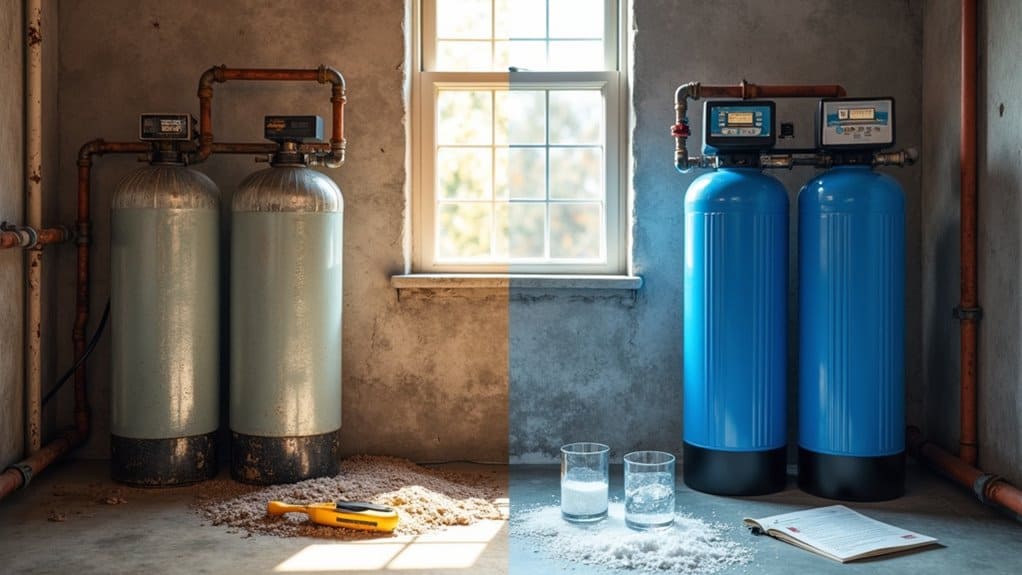Your neighbor’s softener likely outperforms yours through superior technology selection (salt-based vs. salt-free), proper NSF/ANSI 44 certification, professional installation with correct drainage, smart regeneration features, or consistent maintenance. We’ve found these five factors determine water softener effectiveness in thousands of home systems. The difference often lies in regeneration efficiency ratings exceeding 4,000 grains/pound and proper system placement. Discover how simple upgrades can transform your water quality immediately.
Key Takeaways
- Their system likely uses smart technology with regeneration optimization that reduces salt usage by up to 75%.
- Modern water softeners with Aqua-Sensor® technology only regenerate when needed, preventing wasteful cycles.
- NSF/ANSI 44 certified systems offer verified performance that consistently prevents scale buildup in pipes and appliances.
- Strategic installation placement with proper drainage design and bypass valves ensures optimal efficiency and easier maintenance.
- Your neighbor’s system may utilize remote monitoring for leak detection and maintenance alerts, preventing costly repairs.
The Real Differences Between Salt-Based and Salt-Free Systems
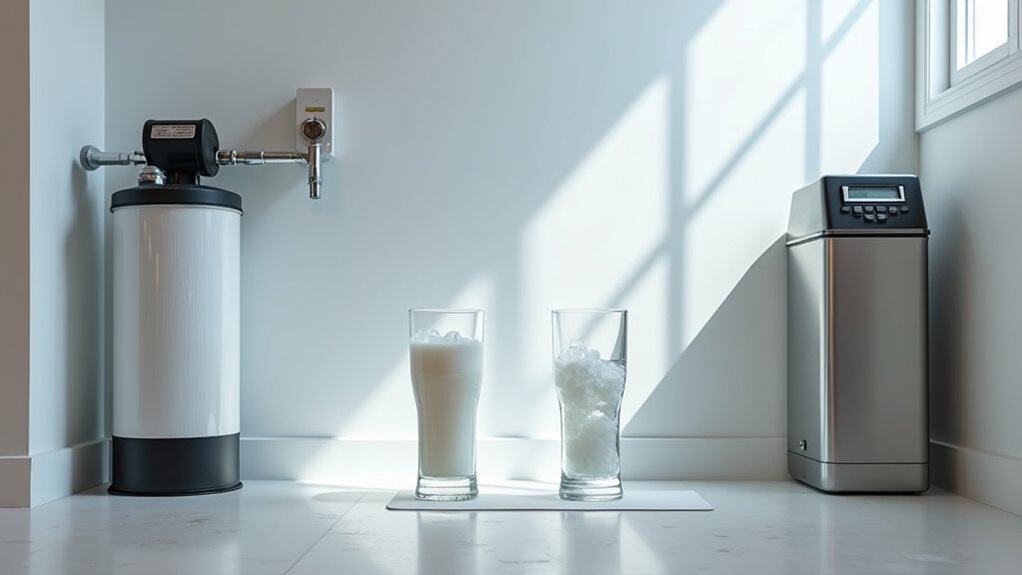
When selecting a water softener system for your home, understanding the fundamental operational differences between salt-based and salt-free technologies is crucial.
Salt-based systems utilize ion exchange, removing calcium and magnesium minerals completely by swapping them with sodium. These require regular salt replenishment and resin bed regeneration. Salt-based systems also effectively remove staining metals that can discolor fixtures and affect water quality. Additionally, salt-based systems can help improve the longevity of plumbing systems by preventing scale buildup.
In contrast, salt-free systems employ Template Assisted Crystallization (TAC), transforming minerals into non-adhesive crystals without removing them from water. They operate continuously without regeneration cycles or wastewater production.
The key distinction: salt-based systems eliminate minerals entirely, while salt-free systems merely neutralize their ability to cause scale damage.
Performance Metrics That Matter: NSF Certifications and Testing
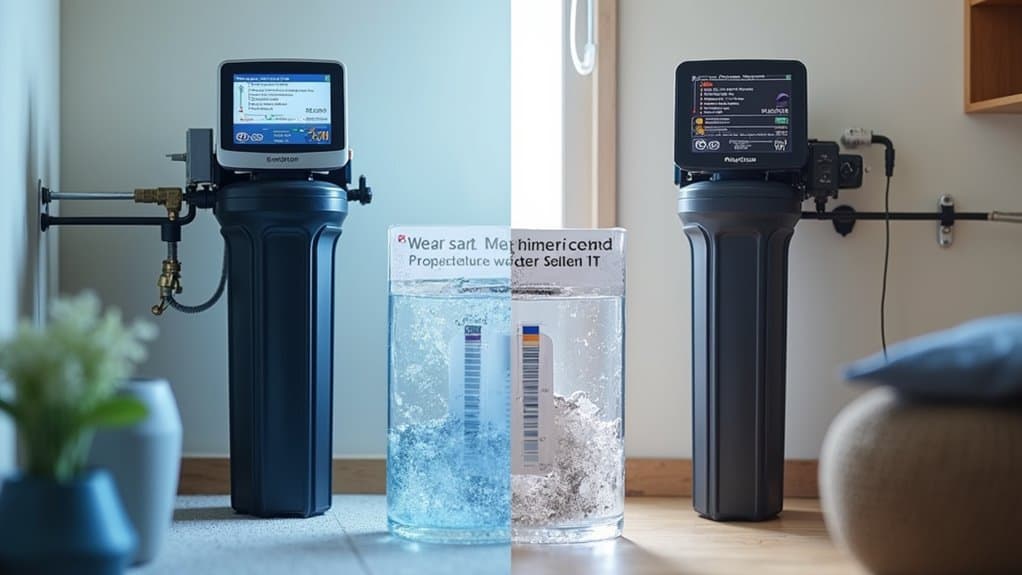
Beyond understanding different water softener technologies, consumers need objective ways to evaluate system performance. NSF certifications provide this benchmark through rigorous independent testing protocols.
Look for systems meeting NSF/ANSI 44 standards, which validate hardness reduction capabilities and salt efficiency (minimum 3,350 grains/pound). High-performing models often exceed 4,000 grains/pound, meeting strict California requirements. Some hidden truths about water softener effectiveness can reveal why certain systems outperform others.
Certified units undergo comprehensive testing for contaminant removal claims, material safety, and structural integrity—unlike uncertified alternatives that lack verification. When comparing systems, check the NSF database to validate manufacturer claims and ensure you’re investing in proven performance rather than marketing promises. Regular filter replacement is essential for maintaining optimal water treatment performance according to manufacturer guidelines.
Installation Secrets That Determine Longevity and Efficiency
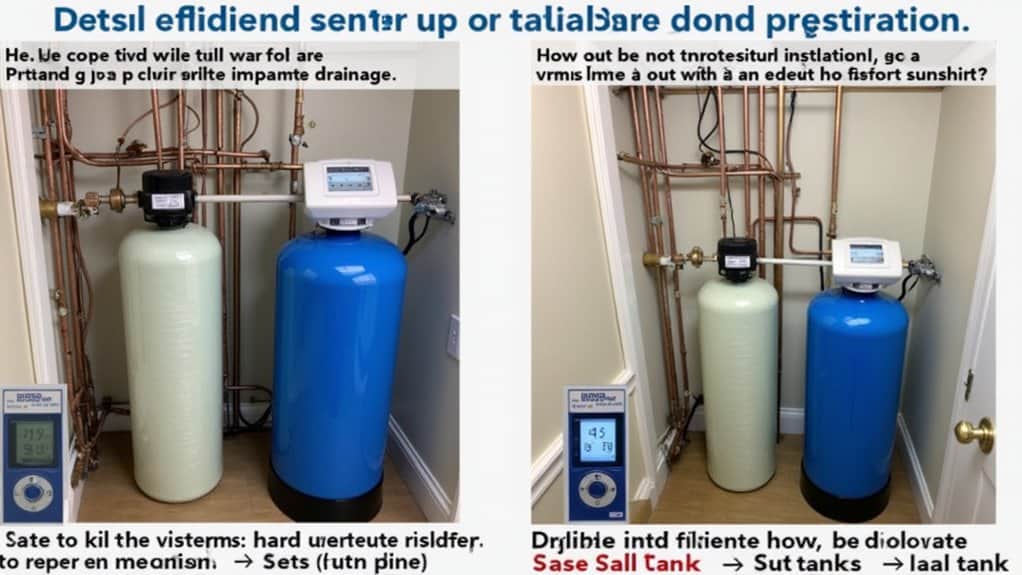
The proper installation of a water softener system represents the critical foundation for its operational longevity and performance efficiency. Additionally, understanding DIY installation techniques can help you avoid costly professional fees while ensuring effective setup.
We’ve found three key factors determine success: strategic placement near water lines with adequate clearance (3-4 feet) for servicing; proper plumbing methodology using flexible supply tubes and compression fittings; and correct drainage design with appropriate slopes and air-gap fittings to prevent contamination.
Don’t overlook the bypass valve installation—it’s essential for maintenance isolation. Professional installation is often recommended as it requires moderate to advanced plumbing skills to ensure optimal performance.
Electrical accessibility (120V within 6 feet) and climate considerations further enhance system performance.
Smart Technology Features Worth Upgrading For
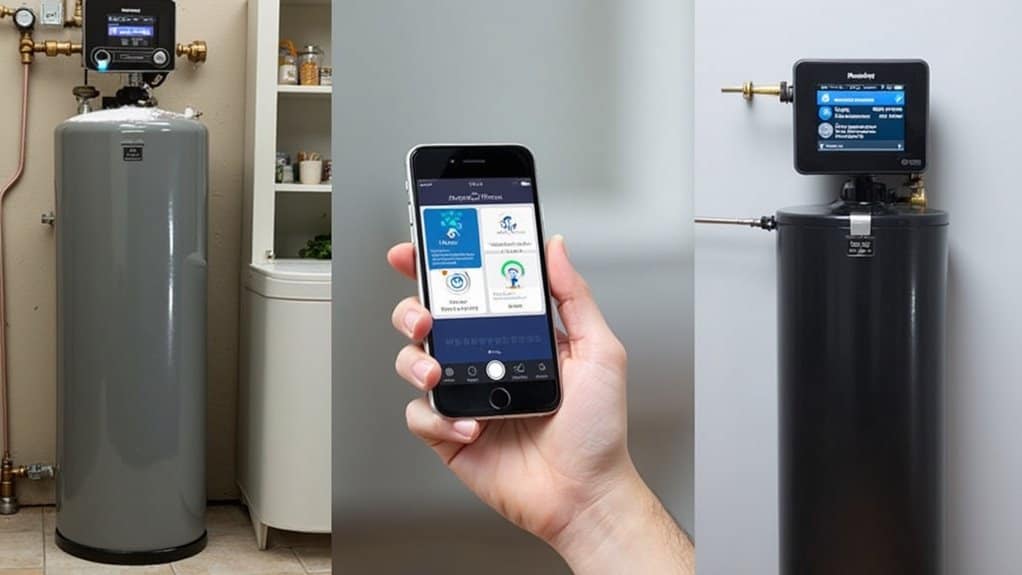
Modern water softener systems have evolved dramatically with intelligent features that transform basic salt-based units into sophisticated water management centers. These advances optimize performance while reducing waste. Additionally, these systems can lead to unexpected advantages such as improved energy efficiency and extended lifespan of plumbing fixtures.
Regeneration optimization represents the most significant improvement, with smart control valves that adjust cycles based on real-time water hardness and usage patterns. The innovative Aqua-Sensor® technology measures water hardness levels to trigger regeneration only when necessary. Learning algorithms predict household demand, while proportional brining targets only exhausted resin.
Remote monitoring capabilities deliver practical benefits through iOS/Android integration. We’re particularly impressed by systems offering leak detection, low salt alerts, and consumption analytics that identify waste. Remote diagnostics allow technicians to troubleshoot issues without visits, minimizing downtime and maintenance costs.
Frequently Asked Questions
How Much Does Water Hardness Affect Appliance Lifespan?
We’ve found that hard water drastically reduces appliance lifespans by up to 50%. Electric water heaters last 6.5 years versus 13 years, while gas units survive only 5.5 years instead of 11.
Can I Install a Water Softener in a Rental Property?
Yes, we can install water softeners in rentals with landlord approval. We recommend temporary systems with bypass valves for easy removal. Renting units ($20-$50/month) shifts maintenance responsibilities to providers.
Do Water Softeners Affect Plants When Using Treated Water?
Yes, water softeners harm plants. The sodium they release displaces essential nutrients, disrupts water absorption, and damages roots. We’d recommend using unsoftened water or alternatives like potassium-based softeners for watering.
How Do Softeners Impact Individuals With Sodium-Restricted Diets?
We’ve found that traditional water softeners add 46-1219 mg/L sodium to water, potentially problematic for those on strict sodium-restricted diets (<200 mg/day). Consider potassium chloride or salt-free alternatives instead.
Can Softeners Remove Lead or Other Heavy Metals?
We can’t rely on standard water softeners to remove lead or heavy metals. They’re designed to exchange calcium/magnesium ions for sodium, not filter toxic contaminants. Consider specialized filtration systems instead.
Conclusion
We’ve examined the critical distinctions between water softening technologies, certification standards, proper installation techniques, and connectivity features that differentiate superior systems from mediocre ones. By upgrading to NSF-certified equipment, implementing correct installation protocols, and leveraging smart monitoring capabilities, you’ll achieve optimal performance metrics and efficiency values that surpass your neighbor’s system. Don’t settle for subpar water quality when actionable improvements are readily implementable.

Craig “The Water Guy” Phillips is the founder of Quality Water Treatment (QWT) and creator of SoftPro Water Systems.
With over 30 years of experience, Craig has transformed the water treatment industry through his commitment to honest solutions, innovative technology, and customer education.
Known for rejecting high-pressure sales tactics in favor of a consultative approach, Craig leads a family-owned business that serves thousands of households nationwide.
Craig continues to drive innovation in water treatment while maintaining his mission of “transforming water for the betterment of humanity” through transparent pricing, comprehensive customer support, and genuine expertise.
When not developing new water treatment solutions, Craig creates educational content to help homeowners make informed decisions about their water quality.


